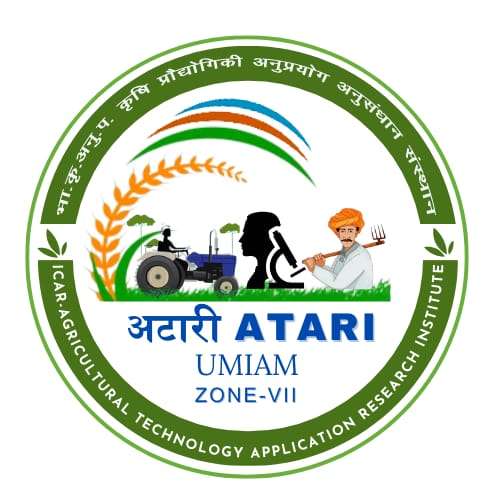The Krishi Vigyan Kendra (KVK) of East Khasi Hills in the state of Meghalaya in India Northeastern Region plays a crucial role in promoting and accelerating agricultural development and supporting farmers in the district through translating research into practical solutions for farmers. The main focus areas include sustainable and organic farming practices in line with the policy of the Central and state Government which includes educating farmers on natural pest control, organic fertilizers, and crop rotation to maintain soil health and improve crop yields. KVK East Khasi Hills functions on a bottom-up approach whereby programs are tailored to the unique farming conditions of the farming community at the microlevel. For instance, it focuses on crops that are well-suited to hilly terrains, such as rice, ginger, turmeric, and temperate fruits and vegetables by introducing varieties produced by various ICAR and State Research Institutes suitable to the climate of the district. The KVK also gives efforts to promote integrated farming systems (IFS) which provides farmers with diverse income sources and improving overall livelihood security. It also acts as a bridge between the different agricultural research institutes and farmers by disseminating advanced farming technologies through field demonstrations, training programs, workshops, and on-site visits, helping farmers learn about the latest agricultural practices, innovative techniques, and new crop varieties.
Some of the key roles of KVK include the following:
- Diversified specialized production and processing of Agricultural commodities:
- Assessing production and processing technologies for local suitability through varietal testing, efficiency evaluation, cost-effectiveness, product quality and marketability.
- Refining processing techniques and packaging to meet local needs based on trials result and farmer feedback.
- Demonstrate proven technologies for acceptance by farmers and rural entrepreneurs.
- Ensuring healthy diets and improved nutritional security through education, nutrigarden demonstration and food preservation training,.
- Driving localized income generation and entrepreneurship opportunities through vocational training, supporting self-help groups and value addition.
- Alleviate drudgery for farm women by introducing appropriate technologies and tools for agricultural tasks.
- Technology Transfer:
- Facilitates the seamless transfer of proven agricultural technologies from research institutions to farmers' fields.
- Evaluating performance of technology in prevailing micro climatic situation under real field conditions, considering local soil, marketing and traditional farming practices.
- Refining and adapting technologies for optimal effectiveness through farmer participatory feedback on applied technology.
- Capacity Building & Skill Enhancement:
- Empowering farmers, particularly women and youth, through targeted vocational training and helping in, fostering agripreneurship.
- Providing continuous professional development for extension personnel, ensuring a network of informed agricultural professionals.
- Our "learning by doing" approach guarantees practical knowledge acquisition and skill development.
- Collaborative approach:
- Working with similar governmental and nongovernmental institutions and organization for bringing about improvement in agricultural production of the district
- Location-Specific Agricultural Solutions:
- Tailoring agricultural practices to meet the unique needs of the district.
- Identification of local problems and addressing local farming challenges, through promotion of sustainable and environmental friendly technologies.
- Knowledge & Resource Center:
- Offering expert advisory services on diverse agricultural and allied topics, including crop management, pest control, livestock care and processing.
- Creating ICT tools to disseminate timely and relevant agricultural information
- Developing a Model Instructional farm at the Centre under various disciplines to provide demonstration opportunity for farmers of the state
- Adapting to climate change:
- Performing critical role in educating farmers on climate-resilient agriculture particularly in the face of unpredictable rainfall and changing weather patterns through introduction of drought-resistant and high-yielding crop varieties.
- Research on performance of new marketable crops for the state
- Introduction and assessment of newer globally demanded crops for testing suitability at the State such as buckwheat, saffron, etc






